Nitroprusside nipride - Study guides, Class notes & Summaries
Looking for the best study guides, study notes and summaries about Nitroprusside nipride? On this page you'll find 531 study documents about Nitroprusside nipride.
All 531 results
Sort by
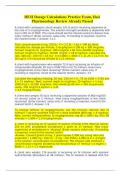 Popular
Popular
-
HESI Dosage Calculations Practice Exam, Hesi Pharmacology Review Already Passed
- Exam (elaborations) • 74 pages • 2024
-
- $20.50
- 1x sold
- + learn more
HESI Dosage Calculations Practice Exam, Hesi Pharmacology Review Already Passed A client with cardiogenic shock weighs 220 lb and is receiving dopamine at the rate of 3 mcg/kg/minute. The solution strength available is dopamine 400 mg in 250 ml of D5W. The nurse should set the infusion pump to deliver how many ml/hour? (Enter numeric value only. If rounding is required, round to the nearest tenth.) -Answer- 11.3 First, convert pounds to kg, 220 lb : X = 2.2 lb : 1 kg = 100 kg. Next, calcul...
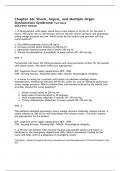
-
Medical-Surgical Nursing: Assessment and Management of Clinical Problems 10e 878
- Exam (elaborations) • 13 pages • 2023
-
- $8.09
- 3x sold
- + learn more
Chapter 66: Shock, Sepsis, and Multiple Organ Dysfunction Syndrome Test Bank MULTIPLE CHOICE 1. A 78-kg patient with septic shock has a urine output of 30 mL/hr for the past 3 hours. The pulse rate is 120/minute and the central venous pressure and pulmonary artery wedge pressure are low. Which order by the health care provider will the nurse question? a. Give PRN furosemide (Lasix) 40 mg IV. b. Increase normal saline infusion to 250 mL/hr. c. Administer hydrocortisone (Solu-Cortef) 100 ...
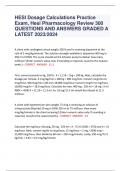
-
HESI Dosage Calculations Practice Exam, Hesi Pharmacology Review 300 QUESTIONS AND ANSWERS GRADED A LATEST 2023/2024
- Exam (elaborations) • 86 pages • 2023
-
- $27.49
- 1x sold
- + learn more
HESI Dosage Calculations Practice Exam, Hesi Pharmacology Review 300 QUESTIONS AND ANSWERS GRADED A LATEST 2023/2024 A client with cardiogenic shock weighs 220 lb and is receiving dopamine at the rate of 3 mcg/kg/minute. The solution strength available is dopamine 400 mg in 250 ml of D5W. The nurse should set the infusion pump to deliver how many ml/hour? (Enter numeric value only. If rounding is required, round to the nearest tenth.) - CORRECT ANSWER 11.3 First, convert pounds t...
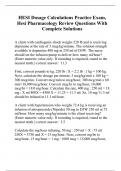
-
Nightingale College HESI Dosage Calculations Practice Exam, Hesi Pharmacology Review Questions With Complete Solutions
- Exam (elaborations) • 86 pages • 2023
-
Available in package deal
-
- $30.99
- 1x sold
- + learn more
A client with cardiogenic shock weighs 220 lb and is receiving dopamine at the rate of 3 mcg/kg/minute. The solution strength available is dopamine 400 mg in 250 ml of D5W. The nurse should set the infusion pump to deliver how many ml/hour? (Enter numeric value only. If rounding is required, round to the nearest tenth.) correct answer: 11.3 First, convert pounds to kg, 220 lb : X = 2.2 lb : 1 kg = 100 kg. Next, calculate the dosage per minute, 3 mcg/kg/min x 100 kg = 300 mcg/min. Convert mcg...
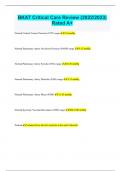
-
BKAT Critical Care Review (2022/2023) Rated A+
- Exam (elaborations) • 12 pages • 2023
- Available in package deal
-
- $9.99
- 2x sold
- + learn more
BKAT Critical Care Review (2022/2023) Rated A+ Normal Central Venous Pressure (CVP) range 2-8 mmHg Normal Pulmonary Artery Occlusion Pressure (PAOP) range 6-12 mmHg Normal Pulmonary Artery Systolic (PAS) range 20-30 mmHg Normal Pulmonary Artery Diastolic (PAD) range 5-15 mmHg Normal Pulmonary Artery Mean (PAM) 11-20 mmHg Normal Systemic Vascular Resistance (SVR) range 800-1200 mmHg Preload volume left in the left ventricle at the end of diastole What is preload affected by? venous return ...
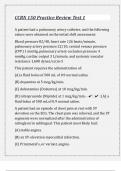
-
CCRN 150 Practice Review Test 1 Review Questions With Answers|74 Pages
- Exam (elaborations) • 74 pages • 2024
- Available in package deal
-
- $13.49
- + learn more
A patient had a pulmonary artery catheter, and the following values were obtained on the initial shift assessment: Blood pressure 82/48, heart rate 126 beats/minute, pulmonary artery pressure 22/10, central venous pressure (CVP) 1 mmHg, pulmonary artery occlusion pressure 4 mmHg, cardiac output 3 L/minute, and systemic vascular resistance 1,600 dynes/s/cm-5 This patient requires the administration of: (A) a fluid bolus of 500 mL of 0.9 normal saline. (B) dopamine at 5 mcg/kg/min. (C) dobut...
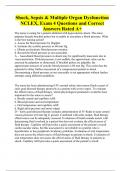
-
Shock, Sepsis & Multiple Organ Dysfunction NCLEX, Exam 4 Questions and Correct Answers Rated A+
- Exam (elaborations) • 74 pages • 2023
-
- $11.99
- 1x sold
- + learn more
The nurse is caring for a patient admitted with hypovolemic shock. The nurse palpates thready brachial pulses but is unable to auscultate a blood pressure. What is the best nursing action? a. Assess the blood pressure by Doppler. b. Estimate the systolic pressure as 60 mm Hg. c. Obtain an electronic blood pressure monitor. d. Record the blood pressure as not assessable. A ~ Auscultated blood pressures in shock may be significantly inaccurate due to vasoconstriction. If blood pressure is not...
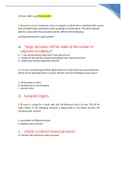
-
MED SURG 3 480 ATI Adv. Med-surg FINAL EXAM Complete test
- Exam (elaborations) • 49 pages • 2023
-
- $18.49
- 11x sold
- + learn more
ATI Adv. Med-surg FINAL EXAM 1. A nurse in a burn treatment center is caring for a client who is admitted with severe burns to both lower extremities and is pending an escharotomy. The client’s spouse asks the nurse what the procedure entails. Which of the following nursing statements is appropriate? a. “large incisions will be made in the eschar to improve circulation” b. “ I can call the doctor back here if you want me to” c. “a piece of skin will be removed and grafted ov...
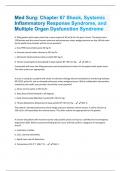
-
Med Surg: Chapter 67 Shock, Systemic Inflammatory Response Syndrome, and Multiple Organ Dysfunction Syndrome Questions and Answers with complete solution
- Exam (elaborations) • 9 pages • 2024
-
- $8.39
- + learn more
A 78-kg patient with septic shock has a urine output of 30 mL/hr for the past 3 hours. The pulse rate is 120/minute and the central venous pressure and pulmonary artery wedge pressure are low. Which order by the health care provider will the nurse question? a. Give PRN furosemide (Lasix) 40 mg IV. b. Increase normal saline infusion to 250 mL/hr. c. Administer hydrocortisone (Solu-Cortef) 100 mg IV. d. Titrate norepinephrine (Levophed) to keep systolic BP >90 mm Hg. - ANS: A Furosemide ...
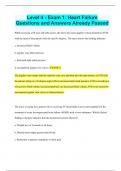
-
Level 4 - Exam 1: Heart Failure Questions and Answers Already Passed
- Exam (elaborations) • 41 pages • 2024
- Available in package deal
-
- $11.49
- + learn more
Level 4 - Exam 1: Heart Failure Questions and Answers Already Passed While assessing a 68-year-old with ascites, the nurse also notes jugular venous distention (JVD) with the head of the patient's bed elevated 45 degrees. The nurse knows this finding indicates a. decreased fluid volume. b. jugular vein atherosclerosis. c. increased right atrial pressure. d. incompetent jugular vein valves. ANS: C The jugular veins empty into the superior vena cava and then into the right atrium, so JV...
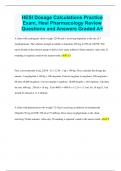
-
HESI Dosage Calculations Practice Exam, Hesi Pharmacology Review Questions and Answers Graded A+
- Exam (elaborations) • 110 pages • 2024
- Available in package deal
-
- $13.48
- + learn more
A client with cardiogenic shock weighs 220 lb and is receiving dopamine at the rate of 3 mcg/kg/minute. The solution strength available is dopamine 400 mg in 250 ml of D5W. The nurse should set the infusion pump to deliver how many ml/hour? (Enter numeric value only. If rounding is required, round to the nearest tenth.) 11.3 First, convert pounds to kg, 220 lb : X = 2.2 lb : 1 kg = 100 kg. Next, calculate the dosage per minute, 3 mcg/kg/min x 100 kg = 300 mcg/min. Convert mcg/min to mcg/hou...

$6.50 for your textbook summary multiplied by 100 fellow students... Do the math: that's a lot of money! Don't be a thief of your own wallet and start uploading yours now. Discover all about earning on Stuvia


